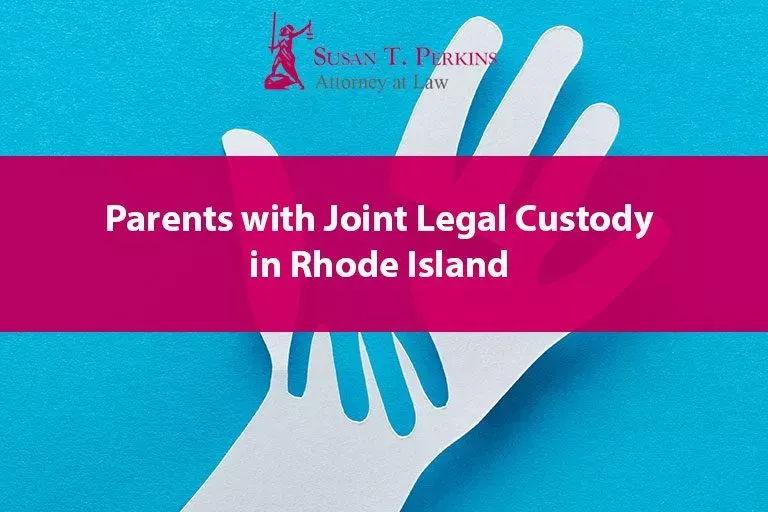
In Rhode Island, it’s very common for parents to share joint legal custody of their children post-divorce. This means that even though you’re legally separated from your ex, you two will still have to discuss decisions for your kids like medical procedures and their education.
With over 25 years of experience helping clients navigate custody agreements, RI child custody lawyer Susan T. Perkins is deeply familiar with exactly what Rhode Island parents with joint legal custody should know.
Keep reading for tips, an explanation of Rhode Island Laws regarding custody, and answers to your most pressing questions about joint legal custody.
Your Worries Might Be Valid
It’s true that no two divorcing couples are the same. At the same time, worrying and disagreeing over what’s best for your kids is a common thread. These clashes can make it that much harder to have joint legal custody.
But it’s not impossible to have a civil co-parenting arrangement.
And when you consider that children of divorce are more prone to mental health issues, you can see just how important it is to prioritize your children right now. Here are three tried-and-true ways to avoid future issues.
- Understand and follow the terms of your agreement. Before you sign anything, consult with an experienced RI child custody lawyer like Susan T. Perkins. This ensures you fully understand the terms—no nasty surprises down the road. Then, be sure to follow the terms of the agreement.
- Prioritize good communication habits with the other parent. We understand setting aside all the anger and hurt caused by your former spouse can be very difficult. But for the good of your children, you must find a way to communicate clearly and effectively—ideally, in writing.
- Know when it’s time to get help. Sometimes, despite your best efforts, a joint legal custody agreement can still negatively impact your children. If you see this happening, a custody modification might be the best path forward.
Understanding What Joint Legal Custody Really Means
Having joint legal custody in Rhode Island typically means you also share physical custody. Per R.I. Gen. Laws § 15-5-16, both parents have a reasonable right to at least visit their children—unless there’s a valid reason this shouldn’t happen.
But while these two agreements typically go hand-in-hand, they aren’t directly connected. Just because the other parent has physical custody 25% of the time doesn’t mean they only get a 25% say in big decisions.
When you share joint legal custody in Rhode Island, you each have 50% of the decision-making power—no matter who the kids are physically with more often.
This is why it’s so crucial to have a crystal-clear parenting plan in place as part of your divorce proceedings. The more detailed it is, the less likely you are to struggle with major disagreements as the children get older.
Rhode Island Parents with Joint Legal Custody FAQs
How is joint legal custody different from joint physical custody?
In Rhode Island, joint legal custody is different from joint physical custody in that legal custody gives both parents equal rights when making big decisions. Joint physical custody, however, has nothing to do with important choices like education, health, and religion.
That said, joint legal custody very often includes joint physical custody in Rhode Island.
The biggest thing to know is that, unlike joint legal custody, joint physical custody isn’t 50/50. You get an equal say in which school your children are enrolled in, but you may simultaneously only have physical custody 25% of the time.
What are the most common issues that arise in joint legal custody arrangements?
Some of the most common issues that arise in joint legal custody arrangements are:
- One parent wanting to relocate post-divorce
- Disagreements over medical treatments and education
- Coordination and scheduling disruptions
- Child abuse and domestic violence
- Choices related to religious upbringing
You might also deal with passive-aggressive behavior or your ex ‘using’ the kids. This often manifests as them trying to spite you by purposely making unfair choices related to your children.
Common examples include not respecting a child’s sleep schedule while they have custody, throwing away things you bought for the children (like clothes and personal care products), and bad-mouthing you while you aren’t around.
Can one parent make decisions alone under joint legal custody?
Yes, in Rhode Island, one parent can make decisions alone under joint legal custody so long as they don’t relate to things like:
- Education and extracurriculars
- Medical treatments and appointments
- Religious upbringing
All decisions regarding matters such as these must be an agreement between you and the other parent. But routine choices, such as day-to-day decisions while your children are in your care, are up to you.
What happens if we can’t agree on a decision for our child?
If you can’t agree on a decision for your child, and there’s no language in your parenting plan regarding this scenario, the court system typically resolves the disagreement.
Usually, you’ll first be required to try mediation. A mediator serves as a neutral third party to help you both come to an agreement. If that doesn’t work or the decision in question isn’t appropriate for mediation, a motion can be filed with the RI Family Court.
This is how you request a hearing with the court to address the dispute. Like many other states, Rhode Island law prioritizes the best interest of the child in this process. They’ll make a decision with this in mind. The court may also order a custody evaluation, which can lead to adjusting your custody agreement via court order.
Whether you’re about to start your divorce proceedings or already have a joint legal custody agreement in place, you’ve got a lot on your plate.
So, we hope this guide on what Rhode Island parents with joint legal custody should know has helped clear up some of your worries. If you’d like to talk with our knowledgeable, experienced RI child custody lawyer Susan T. Perkins about specific issues, call us today at 401-PERKINS.



